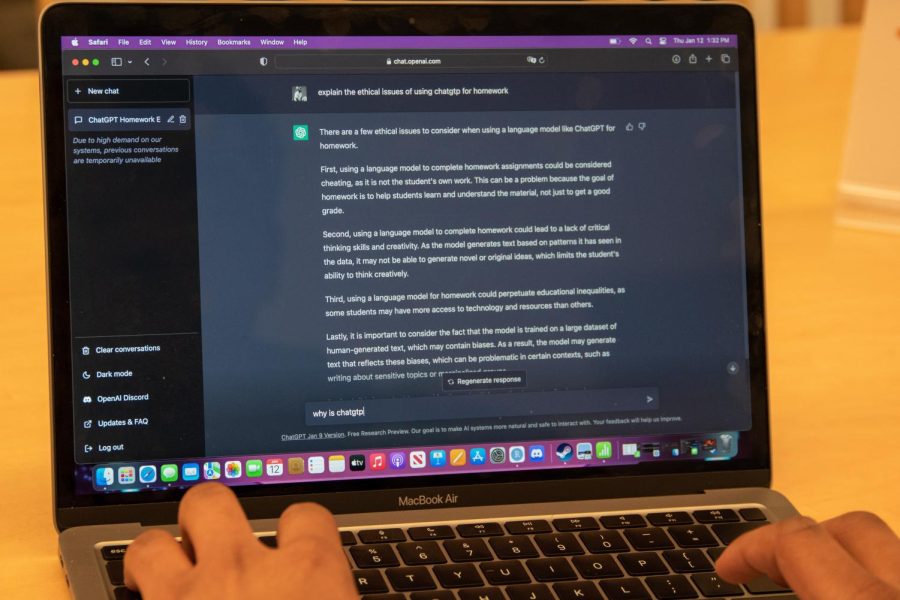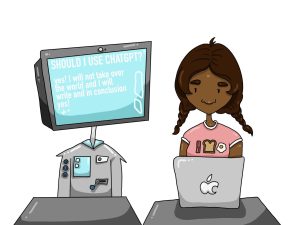Helpful or Harmful? Community debates proper usage of AI writing software
REAL OR ROBOT? With its fluent, human-like writing, the AI language model ChatGPT has made it easier for students to skip steps in the writing process by producing an essay on demand. However, there are potential positive applications for the new technology.
January 18, 2023
New artificial intelligence writing software has changed the game, and now educators and students must determine the line between academic benefit and dishonesty.
ChatGPT, an AI language model released free to the public by Open AI on Nov. 30, 2022, produces fluent communication and conversation, which enables it to write essays based on prompts that a user inputs. Since ChatGPT combines information from many different sources to create an original response, many plagiarism detectors have trouble flagging the work as AI writing.
However, ChatGPT’s writing is unsophisticated, according to Mark Krewatch, English department chair. He has tested ChatGPT using essay prompts from U-High English classes and noticed it would repeat themes and use evidence superficially, if it is even used at all.
Mr. Krewatch said the unspecific, surface-level writing of ChatGPT is exactly what Lab’s English program is supposed to prevent.
“It’s why we do close analysis of literature as opposed to broad thematic writing,” Mr. Krewatch said.
He remains confident that current AI will not enable students to write good English papers, but he recognizes technology will quickly evolve, so a watchful eye is necessary.
While ChatGPT could be initially seen as only a shortcut for student work, it can be used to create models to learn about grammar and style, and critique writing, Mr. Krewatch said. He hopes there is a possibility where the technology can be “co-opted” in a positive way rather than being an untouchable, powerful “third rail.”
History department chair Christy Gerst does not believe that students struggling to understand historical concepts should use ChatGPT to ask for summaries since it lacks depth and accuracy. She encourages students to search topic summaries from library databases instead.
To form academic policies on ChatGPT, English teacher Colin Rennert-May said teachers will need to decide when the program allows students to skip the important learning discovered in the essay writing process.
“I know this can be sometimes hard to believe, but like, it’s really not about the production of this piece of writing,” Mr. Rennert-May said. “It’s about the discovery that happens through the process.”
Ms. Gerst and Mr. Krewatch say AI writing programs are currently covered by the general language of their departments’ academic dishonesty rules because students’ work has to be their own. However, both recognize they still need to determine the exact consequences for using AI to write student essays.
Ms. Gerst recognizes students can view ChatGPT as a “panacea” to essay writing but cautions against that.
“It’s not going to be like a cure,” she said. “It can jeopardize their own mastery of the material.”
Senior Henry Koyner and junior Adam Cheema have used ChatGPT for entertainment purposes and say using the program to write homework assignments and essays has downsides to the learning process.
“I think that a lot of students might see ChatGPT and think that it’s an easy way to get out of writing tests or small writing assignments,” Adam said, “but you wouldn’t really be learning anything if you do it that way.”
Adam says AI has benefits in explaining tricky concepts to students struggling to understand, and Henry says it can help generate ideas for a paper. But, Henry said, students should be wary of the personal dilemma in using ChatGPT.
“I think that if you want to actually learn, you shouldn’t use ChatGPT because you’re not actually being able to take information that you’ve learned and put it on paper or put it into an essay or put it in a research paper,” Henry said. “I think that it’ll just come back to bite you when you have a test or when you have an in-class essay.”
Ultimately, Ms. Gerst hopes students understand that the value of learning comes from the process of discovering it on one’s own, rather than using outside sources like ChatGPT.
“I encourage students to continue with their own writing,” Ms. Gerst said, “because it’s a pathway to their own thinking, their own opinion, their own conscience, their own belief system.”






























































